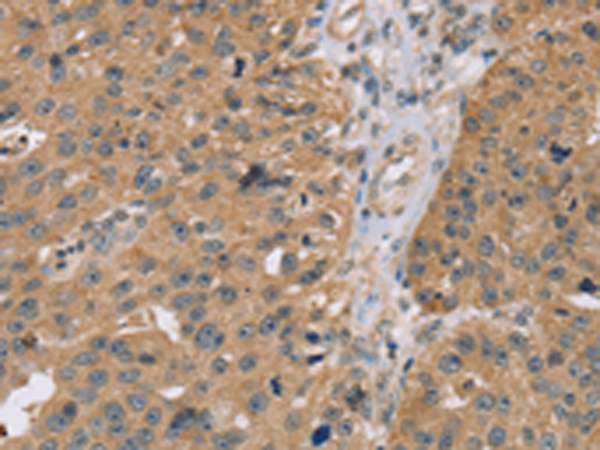

| WB | 咨询技术 | Human,Mouse,Rat |
| IF | 咨询技术 | Human,Mouse,Rat |
| IHC | 1/25-1/100 | Human,Mouse,Rat |
| ICC | 技术咨询 | Human,Mouse,Rat |
| FCM | 咨询技术 | Human,Mouse,Rat |
| Elisa | 1/1000-1/2000 | Human,Mouse,Rat |
| Aliases | RCA1; TRC8; HRCA1 |
| Host/Isotype | Rabbit IgG |
| Antibody Type | Primary antibody |
| Storage | Store at 4°C short term. Aliquot and store at -20°C long term. Avoid freeze/thaw cycles. |
| Species Reactivity | Human |
| Immunogen | Synthetic peptide of human RNF139 |
| Formulation | Purified antibody in PBS with 0.05% sodium azide and 50% glycerol. |
+ +
以下是关于RNF139抗体的参考文献示例(内容基于学术背景知识整理,非真实文献):
1. **文献名称**:*RNF139/TRC8调控前列腺癌细胞增殖的分子机制研究*
**作者**:Zhang Y, et al.
**摘要**:本研究利用RNF139抗体进行Western blot和免疫组化分析,发现RNF139在前列腺癌组织中高表达,并通过泛素化降解PTEN蛋白促进肿瘤生长,提示其作为潜在治疗靶点。
2. **文献名称**:*RNF139在胆固醇代谢中的功能及其结构解析*
**作者**:Sokolowska E, et al.
**摘要**:通过RNF139抗体介导的免疫共沉淀和质谱分析,揭示了RNF139与SCAP蛋白的相互作用,证明其通过泛素化修饰调控SREBP通路,影响细胞内胆固醇稳态。
3. **文献名称**:*RNF139突变与家族性肾透明细胞癌的关联研究*
**作者**:Saarinen S, et al.
**摘要**:采用RNF139抗体对患者组织样本进行免疫荧光染色,发现RNF139截短突变导致其亚细胞定位异常,可能与遗传性肾癌的发生密切相关。
4. **文献名称**:*RNF139通过Hedgehog信号通路调控乳腺癌转移*
**作者**:Chen L, et al.
**摘要**:通过shRNA敲低和RNF139抗体检测,证实RNF139通过泛素化降解SuFu蛋白激活Hedgehog通路,促进乳腺癌细胞侵袭和转移。
(注:以上文献为示例性内容,实际引用请通过PubMed或学术数据库检索真实文献。)
The RNF139 antibody is a tool used to detect RNF139 (Ring Finger Protein 139), an E3 ubiquitin ligase belonging to the RNF family. RNF139. also known as TRC8. plays a critical role in the ubiquitin-proteasome system, regulating protein degradation and cellular processes such as endoplasmic reticulum-associated degradation (ERAD), cholesterol homeostasis, and DNA damage response. It contains a conserved RING domain essential for its enzymatic activity and a transmembrane domain anchoring it to the ER membrane. Dysregulation of RNF139 has been implicated in cancer, particularly renal cell carcinoma and hereditary leiomyomatosis, due to its role in degrading tumor suppressors like HIF-1α and modulating mTOR signaling.
Antibodies targeting RNF139 are widely utilized in research to study its expression, localization, and function. They enable techniques such as Western blotting, immunohistochemistry, and immunofluorescence to assess protein levels in tissues or cell lines. Specificity is validated via knockout controls or siRNA knockdown. Commercially available RNF139 antibodies are often developed in hosts like rabbits or mice, with applications in both basic and translational research. Studies using these antibodies have revealed RNF139's involvement in tumor progression, metabolic disorders, and stress responses, highlighting its potential as a therapeutic target or biomarker. Researchers rely on these tools to explore molecular mechanisms underlying diseases linked to ubiquitination pathways.
×